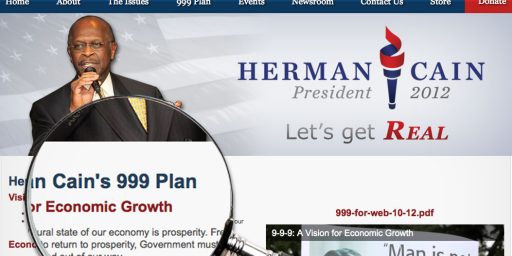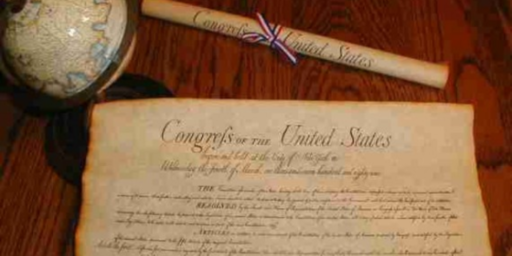Privacy for Congressional Staffers
Rep. Roger Wicker (R-Miss.) is sponsoring legislation that would keep individual congressional staff salaries private.
Wicker introduced legislation last week that would prevent the names of House staffers from being listed in the public reports on chamber disbursements. His bill is a direct response to such salary data finding its way onto the Internet, Wicker said, citing a slew of gossip spreading across Capitol Hill earlier this year after a new Web site went live with staff salaries. “There’s just no point in subjecting individual staff members to this sort of a violation of their privacy,” said Wicker, who added he would reintroduce the measure in the 110th Congress. “It’s one thing for the public to know what a Member earns; that’s a matter of public record. … I think it’s taking it too far for rank-and-file Congressional staffers to have their individual salaries bandied about in the public domain.”
While I’m generally a fan of full disclosure, I sympathize with Wicker on this.
In the main, I’m not sure what the public interest is in knowing what a specific legislative assistant is being paid, really. Wouldn’t publishing what each Member is spending on staff (which I understand is identical for those outside the leadership) as well as the median and range of salaries that Members pay for given staff positions serve the public interest just as well?
Frankly, while I knew that these salaries were technically in the public domain, I didn’t realize that they were so readily available on the Web until I got a press release on this issue from Jock Friedly, the president and founder of LegiStorm, the site at the center of the controversy. In an ensuing dialog, he observes,
I used this kind of information for the public good when I was a reporter. I wrote about nepotism (that involves a criminal statute), members of Congress hiring sons and daughters of big contributors, use of official staff to work on political campaigns and private businesses (also illegal). There is one Republican committee chair whose mistress (according to published reports) is still listed on LegiStorm on the payroll making a fairly hefty sum of money. The Rep. Wayne Hays (D-Ohio) scandal of the 1970s – in which the powerful committee chairman hired as a secretary a mistress who couldn’t type – is still often talked about in Washington. Even the absence of a person on the official payroll can be of huge public significant. For example, Rep. Tom DeLay’s main gatekeeper was no longer on payroll but actually a lobbyist working closely with Jack Abramoff taking millions of dollars from foreign and other interests. Without having payroll records, there’s no way to know any of this.
Even for academic purposes, there is value in having the full data. For example, knowing about pay disparities between men and women or being able to find out what typical press secretaries make (you can’t separate out that data if it’s lumped together as an average per office).
These are all fair points, I think.
Still, there has to be a way to serve these sort of public interest requirements and still preserve the individual privacy of staffers. Frankly, below the chief of staff level, most staffers make paltry salaries by DC metro area standards. While that’s hardly a state secret, the details are not well known. And it seems much more likely that the data will be used by curiosity seekers more often than journalists and academics.
Academic needs could be easily met through practices now standard in other areas. For example, aggregate data could be kept on salaries with cross-tabs available for gender, race, and so forth but without a person’s name attached. And the actual names could be released, if there is some legitimate historical purpose to be served by that, after a period of, say, ten years.
Reporters and public interest groups looking into corruption charges could certainly be given access to the data via the mechanism of a Freedom of Information Act (FOIA) request. That would slow down the process slightly, to be sure, but it would allow for legitimate use while discouraging nosy neighbors and casual acquaintances from snooping into people’s incomes.






Don’t forget thos Chief of Staffs who were double dipping as campaign managers and getting paid full time with our money.
And I say we should have all the minutia available to us…its called transparency and it makes govt run more honestly….after all as bush has shown, you can block any meaningful info from getting out through the FOIA and a few carefully worded executive orders.
With the (altogether appropriate) recent focus on revolving doors and staffers-turned-lobbyists, this information needs to remain in the public domain. Like the typically low salaries themselves, public knowledge of their details is another part of the price one pays for the privilege of public service. We could lower that price and arguably get more people to serve, but only at the cost of risks that aren’t worth it.
Outside the Beltway, I doubt there are many who would bother to snoop. Inside the Beltway, I doubt that anything gettable with an FOIA-request wouldn’t be widely known among those inclined to gossip anyway.
Why shouldn’t the names of House staffers be listed in the public reports on chamber disbursements, after all, ultimately, we are paying them. If they are not doing anything wrong they have nothing to worry about.
I don’t see what is the big deal. I used to work in local government. My salary and the salaries of the other 200 employees in the city were all public knowledge.
If you don’t want the public to know what they’re paying you, then don’t work for the public.
I’m not sure that Congress is subject to FOIA; which means that any salary information would not be either.
Bill/Beldar:
Perhaps I should have said a FOIA-type request. I’m just saying that there could be a mechanism to release the info to reporters, academics, and others doing legit research without simply posting them for everybody.